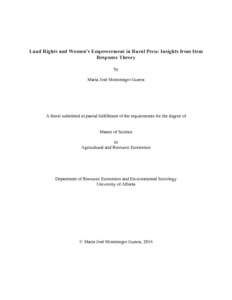Resource information
Women’s land rights are increasingly advocated as an empowerment tool to spur development outcomes. However, empirical evidence of this relationship is limited. In this study we use data from peasant communities in rural Peru to explore the effect of the intra-household allocation of inherited land on women’s empowerment. Empowerment is modeled as a latent variable measured by different influence indicators using a Generalized Structural Equation approach. We draw on Item Response Theory (IRT) to estimate difficulty and discrimination parameters which can inform policymakers about the impact of empowerment policies on women’s types of influences within their households. The empirical approach is consistent with empowerment’s latent and multidimensional nature and pays attention to endogeneity issues often present in other empirical studies. We find that although women’s land rights increase empowerment, the intra-household allocation of land determines the magnitude of this impact.


